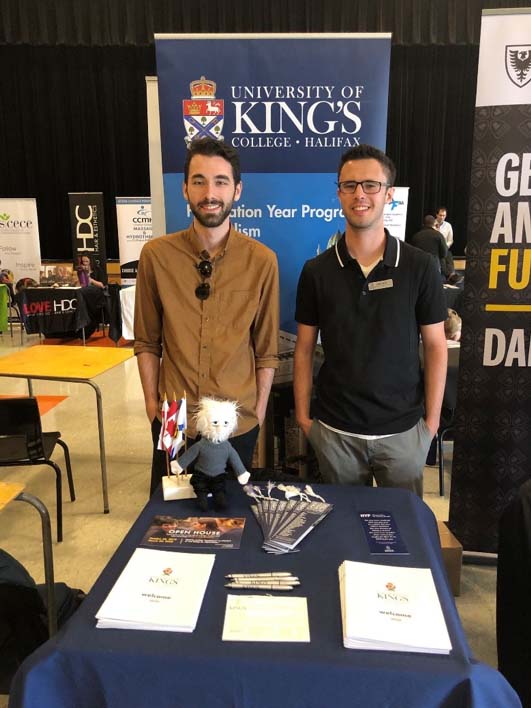
Hi! We’re Andrew and Josh, two of King’s road warriors/recruiters. Over the last few months, the two of us have gone to over 100 towns and cities in six provinces, visited well over 100 high schools both large and small, drank an incalculable amount of coffee, and met approximately 4 trillion students trying to figure out where they might want to go to university.
As our travels are winding down and we’re finally back to sleeping in our own beds, we decided to pool our experiences and come up with a list of the most common questions students asked us this fall. Hopefully, you can find the answer to one of your burning questions below, but if not, feel free to reach out!
1. What even is King’s?
King’s is a small, liberal arts university in Halifax, Nova Scotia. Aside from that, King’s is old. At 230 years old, King’s was 78 years old when Confederation was signed. We’ve created a reputation for being an academically rigorous school, but at the same time having a warm and inviting atmosphere. If you like studying philosophy, journalism, history, English, science or performing arts, then we’re a school you must check out!
2. I keep hearing about something called “FYP.” Did King’s invent this word?
Andrew: No! We’re unfortunately not Oxford University, so we don’t have our own dictionary. It’s an acronym for our beloved Foundation Year Program. Think of FYP as a long and winding journey through western history, where you read many of the great books that have shaped the way the western world has developed, and end up with a better understanding of the world we live in today.
3. But FYP is just one year; what comes next?

What comes next is up to you! Between King’s and neighbouring Dalhousie University, the number of possible degree combinations might as well be infinite. As you move through FYP, you’ll probably feel yourself pulled in a certain direction. Maybe the philosophy readings speak more to you than others, or perhaps the political theory of 17th century England riles you up in ways you hadn’t before thought possible.
Regardless of where your interests point after FYP, there’s a clear pathway to satisfying them. King’s has three different upper year programs that are perfect for students who find themselves interested in particular sections of FYP.
In a nutshell, if you have a:
- high interest in FYP sections three and four about the renaissance and art, then you will probably have a good time in the Early Modern Studies program.
- high interest in FYP sections 5-6 about 19th and 20th century political theory, then you should check out the Contemporary Studies program.
- high interest in FYP in relation to science, it would be worth your time to investigate the History of Science and Technology program.
If these programs don’t look interesting to you, all of the programs in the Bachelor of Arts, Bachelor of Science, and Bachelor of Music degrees offered through the King’s and Dalhousie partnership are still available to you without skipping a beat. This is because FYP makes up many first-year requirements you will need for any of these programs.
4. What is the journalism program like?
The journalism program at King’s is one of the best in the country. That’s because you learn by going out and getting hands-on experience. During your four years in school you’ll produce stories for online, radio, video and photojournalism platforms.
During the fourth year, you’re only doing journalism work; that means there are no exams or essays, students are just going out and writing stories! The year starts by doing an honours project for eight weeks and then it divides into six-week workshops. In these workshops, students can learn what it’s like to report daily news, be a part of a tv or radio newscast team, write long-form stories, work on investigative journalism, or produce tv and radio documentaries. The students’ work is published on our own news site, The Signal.
By the end of fourth year, students complete a month-long internship at an approved publication, like the Globe and Mail, CBC or National Post. By the time students graduate, they have completed enough work to create an impressive portfolio of about 12-15 stories and have some professional work experience just by completing the degree!
5. Isn’t King’s a part of Dalhousie?
Well…sort of. Yes and no. Here’s what’s important for you to know. King’s and Dalhousie (Dal) are separate schools, but we share a Faculty of Arts and Social Sciences, and Faculty of Science. Many of our students—especially our Bachelor of Music students—take classes at the Fountain School of Performing Arts. This means if you want to do FYP in your first year and then major in any field of study offered by the three faculties we share at Dalhousie, you can. King’s students also have access to all of Dal’s resources too like the Dalplex, libraries, Student Health and Wellness office and more. It’s an awesome relationship that benefits us all.
6. I’m hoping to get a scholarship. What do you offer?
King’s offers three different types of financial aid:
1. Entrance scholarships. If you have an average of 85% or greater by the time you submit your transcript (deadline March 1), a chunk of money will be deducted from your tuition. These are renewable, so keep those grades up and the rewards will be great!
2. Major scholarships. These require an external application and a short essay in response to a question. This year, we’re asking you to write about the concept of doubt and certainty.
3. Bursaries. These are given out based on demonstration of financial need.
The nitty gritty details for both of these can be found on the scholarships and bursaries pages.
7. What kind of career can I expect after I graduate?
What kind of career do you want? The idea of traditional career paths is quickly becoming something from the past. Learning how to critically think and communicate is just as important as tangible, transferable skills. King’s equips you with both so you can move confidently towards whatever direction your passion takes you in. Our alumni are journalists, business leaders, policy advisors, teachers, lawyers, academics, scientists, etc. For an extensive list of what some of our alumni are up to, check out ukings.ca/stories.

